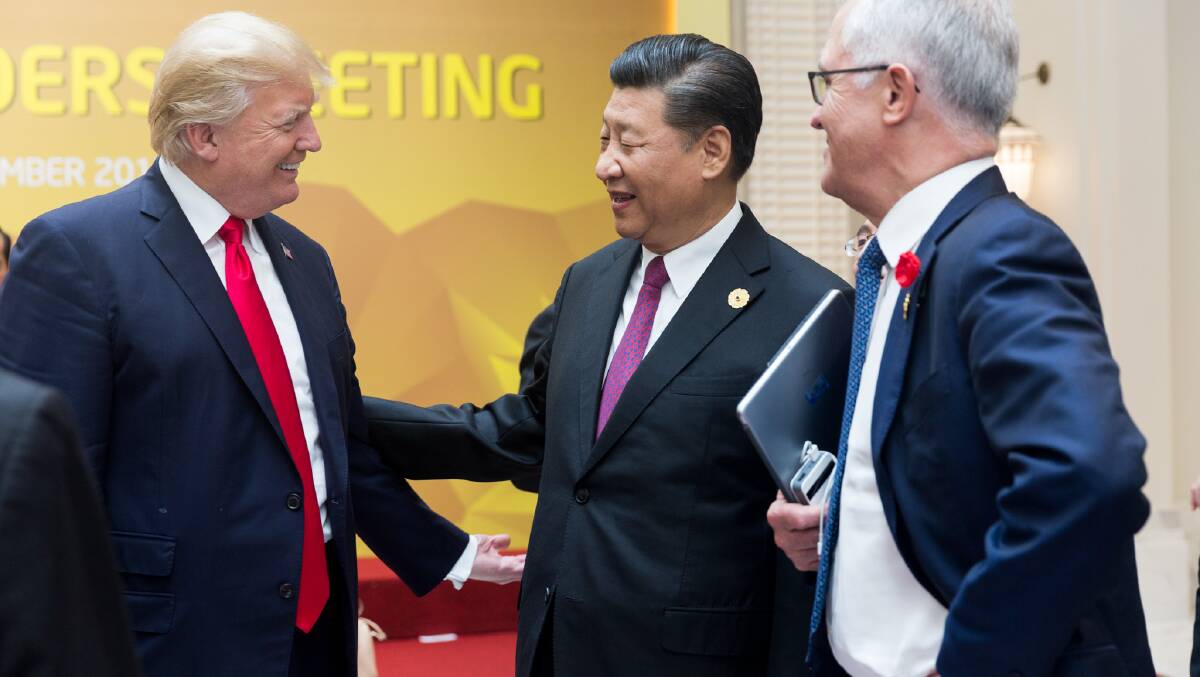Now I don't want to scare you, but what if Trump wins?
Well, I suppose I do want to scare you. If our government is ignoring the risk of a disastrous turn in our national security, one that could follow the ex-president's re-election, we should think about the gamble it's taking.
Anthony Albanese's government is not doing nearly enough to prepare for Australian military self-reliance, even though there is no assurance that the US will stand by us and our neighbours. There never is, but the risk of the US downgrading its commitment to the Western Pacific will jump if this year's election returns Donald Trump to the White House.
Our defence budget needs to rise far above its current level of 2 per cent of gross domestic product, quickly. Labor came to office making all the right noises about urgency in defence, but in practice it has allocated no more money and isn't serious enough in redistributing what it does spend.

A second Trump term could send us hurtling towards the scenario I call China on Our Doorstep. That's the one in which the US fails to defend Taiwan, causing Southeast Asian countries to cave in to Beijing, which then exploits their obedience to extend its military perimeter to islands to our north.
That scenario is always a possibility, either because the US could try to defend Taiwan against a Chinese attack and fail, or because the US might not try. If Trump becomes president again, there's a bigger risk that it wouldn't try.
His foreign policy follows a principle called America First. In particular, he's fed up with allies that bludge on Washington's defence budget. Also, he's simply unpredictable.
Helpfully for us, however, other allies appear to be bludging more than Australia is, so he'd take aim at them first. And he's got it in for China.
Trump is the leading contender for the Republican presidential nomination, and polls show he is about equal to Joe Biden in voter support for the upcoming general election. Whether any of the four criminal trials he is facing will upset the election is hard to forecast. So the possibility of another Trump presidency is live.
"America First" doesn't mean "help Australia", or indeed "help Taiwan" or "help Japan, South Korea, the Philippines and Thailand", the US's other Western Pacific allies.
Washington is spending 3.5 per cent of GDP on defence, which, as Americans are increasingly aware, mainly means spending on defending other people. Defending the US itself would actually be a very economical business, since Canada and Mexico are weak and friendly and all the significant bad guys are beyond the Pacific and Atlantic oceans.
Actually, it's hard to understand how US foreign-policy elites have managed for many decades to keep the American defence budget high.
MORE AGE OF THE DRAGON:
The outrageous case in point is the US contribution to defence of European countries and, right now, to Ukraine. Supporting Ukraine is an absolute must, to protect an increasingly democratic country and to resist Russian expansion. But that is first, second and third a European problem that Europeans are quite rich enough to handle.
Trump sees Germany spending 1.4 per cent of GDP on defence and is rightly outraged. You can bet he's not satisfied with France's 1.9 per cent nor even Britain's 2.2 per cent.
He has said that if re-elected he will fundamentally re-evaluate the purpose of NATO, the transatlantic alliance aimed at resisting Russia. Have no doubt that he'd do it and that the result would be drastically less US spending on European defence.
Let's hope that unburdening the US in that way would satisfy him, because if he really wanted to save money he'd only have to do a deal with China over Taiwan. "Buy more of our soybeans and you can have Taiwan," he might say to Xi Jinping, before turning around to tell the US navy and air force that they don't need all those ships and aircraft any more.
After being soft on Beijing early in his 2017-20 term, Trump has become highly anti-China, and it helps that his supporters generally are too, along with most of Congress. But he's highly unpredictable. His policy could turn on a dime, as the Americans say.
It's more likely to turn if he thinks about the defence effort of Western Pacific friends. Because if they're on the front line in facing China they should not expect to get help from the US unless they are themselves spending plenty.
Japan is increasing its defence budget but it's still at only 1.1 per cent of GDP, according to the globally standardised calculations of the Stockholm International Peace Research Institute. South Korea is at 2.7 percent, but it wastes a lot of its money on national vanity projects instead of concentrating on the North Korean and Chinese threats.
Australia needs to get moving. It would be distasteful for most Australians to think of our task as increasing defence spending to impress Trump, though satisfying him would in fact make us safer.
But the key point is that our defence is primarily our responsibility. And our current effort is inconsistent with being one of the countries that would go under Beijing's thumb if it isn't prevented from dominating this side of the world.
Also, we need to prepare specifically for China on Our Doorstep, which could be our situation as early as the 2030s if Trump throws Taiwan to the wolves in 2025-28. Don't expect Southeast Asian countries to stand up to Beijing if it happens.
- Bradley Perrett was based in Beijing as a journalist from 2004 to 2020.


